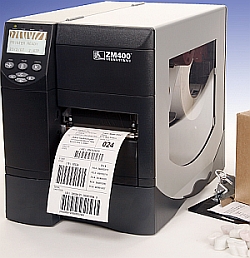Printers can help save lives, too

One may overlook the humble printer, but this device can play a crucial role in the area of healthcare, too.
For example, 93 Zebra ZM400 printers are vital for the Prince Court Medical Centre (PCMC) in Kuala Lumpur, Malaysia, to dispense healthcare.
 Prince Court Medical Centre uses the Zebra ZM400 to print patient labels and wristbands for identification. |
David Cheah, telecom and technology manager of the private healthcare facility, told ZDNet Asia in an e-mail that admission and nursing counter staff use the devices to print patient labels and wristbands used for identification purposes and in preventing human error.
Zebra's strong presence in the healthcare industry was a strong factor in PCMC's selection process, he said. In addition, there was strong support from the vendor and its Malaysian partners throughout the selection process and implementation, said Cheah.
PCMC's services include cosmetology, cardiology, burns treatment, plastic surgery, wellness and treatment for children. With plans to expand its facility to 200 beds, Cheah envisions the need for more such printers.
Multifunction printers cut hospital costs
Separately, at Ballarat Health Services, multifunction printers (MFPs) from Hewlett-Packard are used across the Australian hospital's two key areas--clinical section which provides direct care to patients, and the administration department.
Andres Haas, acting IT director at the hospital, told ZDNet Asia in an e-mail that the machines have allowed the facility to streamline and contain costs within the hospital environment.
The devices' digital sending capabilities let staff scan and store documents in .pdf format so distribution can be done via e-mail instead of through paper copies. Additionally, staff can fax directly from their PCs using the MFPs.
Ballarat Health is the largest regional hospital in the Grampians region in South Australia. It offers multidisciplinary healthcare, including regional hospitals, aged and psychiatric care, community services, and women and children's health services.
There are 80 MFPs and 100 printers installed at 11 main sites within Ballarat Health, each tailored to particular workgroups or physical locations. When the hospital first trialed an MFP, it found the functionality and ease of use of the control panel as well as the performance of the machine impressive. This led to a decision to purchase a complete software and hardware solution from the vendor.
Other key criteria were ease of use, reliability and cost. The printers' easy-to-manage technology helped the medical facility to reduce the number of its printing devices from 300 to 180, and cut more than 30 percent off the total cost of ownership of its printing equipment.
Maintenance and equipment-related faults also decreased by between 25 percent and 30 percent, Haas said.
Fax as a safeguard
Meanwhile in Singapore, the Parkway Shenton Healthcare group uses the MFC-7420 and 7340 MFP from Brother for its printing needs.
Clinics in the group employ the fax capability of these machines to transmit and receive medical documents, memos, duty rosters and patient appointment schedules to and from its headquarters. Faxes requesting for drugs or consumables are also transmitted among the clinics.
Ong Pang Eng, IS manager at Parkway Shenton, said transmitting these documents as both e-mail and faxes has its advantage.
"This is to ensure receipt, as e-mail may bounce due to full mailboxes. Also, as clinic assistants may be busy attending to patients and assisting doctors, faxes are physically visible when they are received," Ong explained in an e-mail.
The clinic assistants also use the MFPs to scan medical and laboratory reports for archiving purposes and print daily statistical reports from the clinic management system.
The company's doctors, too, are among the main users of the printers which they utilize to print patients' medical reports.
Parkway Shenton provides clients with a wide range of healthcare services, from general consultations to specialized industrial healthcare consultancy. It also offers clients priority access to the three hospitals in Singapore belonging to parent company Parkway Group Healthcare.
Looking ahead, Parkway Shenton plans to have MFPs that come with multiple trays that can accommodate the printing of medicine labels and A5-size paper for medical certificates and cash receipts. These print jobs are currently done with dot-matrix printers which Ong noted are "rather noisy".